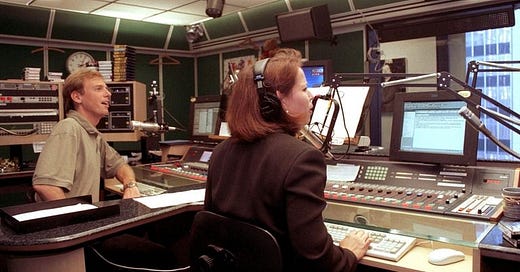The Death of News Is A Bitter One
How the Closure of WCBS 880 Will Continue To Other Parts of the Country
Wayne Cabot signed off his broadcast for the final time at 11:59:51 p.m. before WCBS became an ESPN licensed station after an hour of
News deserts are a growing concern in journalism, and the situation is worsening with the emergence of more such deserts across the United States.
The University of North Carolina-Chapel Hill Hussman School of Journalism reports that 200 U.S. counties lack a local newspaper, and 1,540 towns have only one newspaper or media publication. Surprisingly, the concept of 'radio deserts' or 'Radio News deserts' has not been a topic of discussion in any media platform.
Radio desserts are in the same boat as news desserts, as this form of media has seen drastic changes throughout the decades.
One thing that contrasts with the journalism medium is how radio has evolved into new forms, such as podcasts and sports radio.
However, in 2021, Statista dot com discovered that traditional radio is declining in cars, with many newer vehicles needing to have traditional radios playing.
This is because there are over 15,000 radio stations across the United States and Canada, but many radio stations have struggled to stay open for over 20 years. This is where WCBS Radio comes in.
WCBS Radio was an institution in New York for over 50 years.
Two weeks ago, Wayne Cabot, a longtime radio host for the station, closed his show at 11:59:50 p.m. before what was WCBS 880 became an ESPN station as New York is left with a minimal amount of news coverage in the smaller areas of the state. Keep in mind that New York is a top-five media market.
This problem has affected smaller areas such as New York; according to the research center, Current dot org, there was a significant decline between 2016 and 2020 as 10.8 million people listened to all news radio stations.
This is a sharp decline compared to the 12 million radio listeners stations had before the pandemic.
This has been affecting stations that have not been competitive with the times. Still, the message in the past few years has been clear: audiences need a newer way to listen to the news as one could get more reliable information from Tucker Carlson or Megan Kelley on their podcasts that air, just like radio, anytime and anywhere, but it's about finding a balance between listening to mostly conservative views and controversial opinions along with listening to other political opinions.
This sharp decline in radio news coverage has affected newspapers and magazine companies. Without reliable journalism on the radio, there will be no storytelling and accountability coverage.





